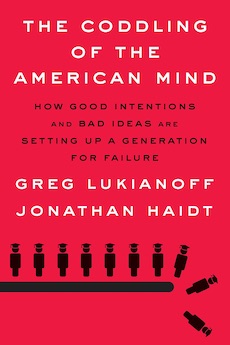By John McWilliams
Three recent, widely publicized books circle around the same discouraging descriptors of today’s rising generation of late Millennials and of I-gens, who are now emerging from college. William Deresiewicz writes as a disillusioned ex-academic, raised to succeed within the elite classrooms and institutional practices of Columbia and Yale (Excellent Sheep, 2014). Jean Twenge writes as a professional sociologist, careful to provide representative samples of changing fact and opinion by citing broad surveys and providing appropriate line graphs (i-Gen, 2017). Lukianoff and Haight, by contrast, write from the broadest possible cultural and intellectual spectrum (Buddha to Marcuse), examining American educational and familial practices within universal frameworks of social psychology (The Coddling of the American Mind, 2018). But certain words characterizing today’s youth recur with telling frequency in all three: “fear,” “fragility,” “risk averse,” “anxiety,” “depression,” “need for safety,” “prolonged adolescence,” “late maturity,” “entitled privilege,” “groupthink” and “coddling.”
The word governing all is “Fear:” fear of failure whether academic or financial, fear of emotional commitment, fear of self-reliance, fear of another cataclysm like 9/11 or 2008—a fear that seeks safety in all its forms, including the seeming safety of unanimity of attitudes. All three books are concerned to arrive at prescripts for needed reforms that, true to a long-standing American faith, consider the educational system, kindergarten through graduate school, as the essential force for social change. At the same time, however, all three books see today’s colleges and universities as complicit with, often catering to, the very qualities they should be seeking to challenge.
Among the three books, The Codding of the American Mind is the most explicit in detailing well-known incidents of student demands for safety (trigger warnings, safe spaces, disinvites, bias response lines, etc.). The book recounts how violence has recently resulted when ideas deemed unacceptable, by the right or the left, are cited to justify the violent stifling of free speech (Claremont-McKenna, Middlebury, Berkeley, Charlottesville). Speech and violence, Lukianoff and Haidt repeat, are fundamentally separate. To assume that speech is a form of violence is an example of “concept creep” that encourages a “callout culture” recalling the witch hunts of yesteryear. The social justice sought by today’s left-leaning academy can be evaluated either as a desired result (enforced equality) or as a desired process (due process in fairness to all idividuals). So which would you prefer, Lukianoff and Haidt ask the reader, fair inequality or unfair equality?
The Coddling of the American Mind links today’s much decried polarization to the dominance of identity politics. The identity politics of the far right and far left, based upon class and community as well as race and gender, feed off each other in patterns of clamorous and mounting accusation that impel separatism.
Unlike Deresiewicz and Twenge, however, Lukianoff and Haidt do not ascribe the fundamental causes of these qualities to the particular conditions of the United States today. They place their argument within the wide net cast by Emile Durkheim, who argued that mankind’s timeless need to form and act within groups leads to thinking that may be called “tribal.” Accordingly, Lukianoff and Haidt call for far more than familiar external palliatives such as restricting i-phone use, requiring a gap year after high school, expanding one’s outlook through civics courses and debate, and university demands for diversity in viewpoint as well as in race. They seek to re-form the thinking process through applying a version of Cognitive Behavioral Therapy. Coddling, they argue, has allowed emotional reasoning, overgeneralizing, binary thinking, labeling and blaming to become acceptable, habitual means of discourse. Especially within educational systems, such coddling encourages students to judge others by immediately applying standards of victim vs. oppressor, rather than fact and truth. The practice feeds dichotomous thinking, a world of Good vs. Bad, in which group emotion drives out the opportunity to reason together. Parents need to prepare the child for the road, not the road for the child. All of us, not only the i- gens, faculty, bureaucrats, and politicians, need to examine our own thought processes. If we will not do so, the reintroducing of a civics course, requiring a gap year, fashioning noble sounding educational purposes, even the forced protection of free speech, are likely to do little good.
One hopes that the discouraging findings and dark predictions of these three books will prove to be overly alarmist. Their prescripts for re-form, both broad and narrow, may gain traction. But even if we doubt this reassurance, it is incumbent to remember the premise of Thomas Jefferson’s argument for free speech, without which we would not have the first amendment to the Constitution. Only through free speech and a free press, Jefferson argued, can truth be winnowed from error through reasoned debate. Jefferson well knew that truth would often be obscured, sometimes deliberately, by laws of free speech and by the biases among the press, whose voices would be protected by the first amendment. But he also knew that, without free speech and reasoned discourse, there is only a miniscule chance, if any, for the truth ever to prevail.
John McWilliams (ΦBK, Princeton University, 1962) is an emeritus professor of humanities at Middlebury College and a resident member of the Beta of Vermont Chapter of Phi Beta Kappa.




